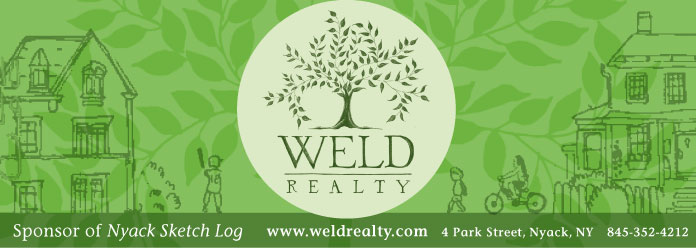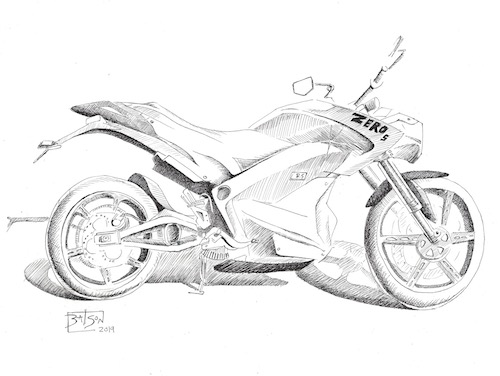 by Bill Batson
by Bill Batson
Science tells us, unequivocally, that the behavior of billions of humans has created an existential threat to the earth called climate change. According to Professor Karl Coplan, if humans change their behavior and reduce their carbon footprint, we might have a chance to bequeath a living planet to future generations. Coplan also demonstrates through his life style, that the journey to a lower carbon footprint can be a cool ride.
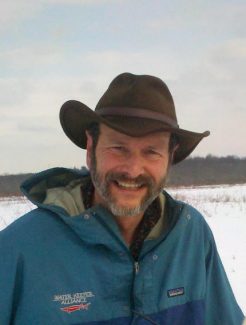
I think that an individual direct footprint of four tons per year is defensible as sustainable for a middle class citizen of a developed nation during the phaseout of all fossil fuels over the next few decades.
In November 2019, Coplan will release Living Sustainably Now: A Low-Carbon Vision of the Good Life. His credentials, academic, legal and practical, are extremely impressive. A professor at Pace University School of Law, he directs their Environmental Law Center and has been outside counsel for Riverkeeper, and clerked for United States Supreme Court Chief Justice Warren Berger. And to practice what he preaches, he has kayaked and biked to work, retrofitted his home, and found a way to make vacations intermittent energy fasts for over 30 year, reducing his carbon footprint to half of the average American.
Tonight, April 16 at 6:30p at the Nyack Center, Karl will present some of what he’s doing to reduce his carbon footprint. If the weather’s good, Coplan may ride his Zero Series S electric motorcycle to the venue, navigating through the crowded crossroads of the environment, science and the law. For the sake of our future, stop by and learn to walk a mile in Karl’s low carbon shoes (or ride a mile on his low carbon motorcycle, or row…you get the picture!)
Where does your passion for the planet come from?
How can anyone not have a passion for the system that sustains all life? But, more personally – growing up as the skinny kid who was not very good at sports, I found in nature both an inner peace and physical challenges and confidence that sustain me to this day.
What was it like clerking for United States Supreme Court Justice Warren Burger?
It was a very heady experience to be on the inside of every Supreme Court case and discussion for a year, just one year out of law school. Not only were there the conversations with the Chief, but the give and take discussions in the clerks’ network of law clerks for all nine Justices. No other legal experience in my career has been at that level.
What are some of the most important cases that you have brought to protect the planet?
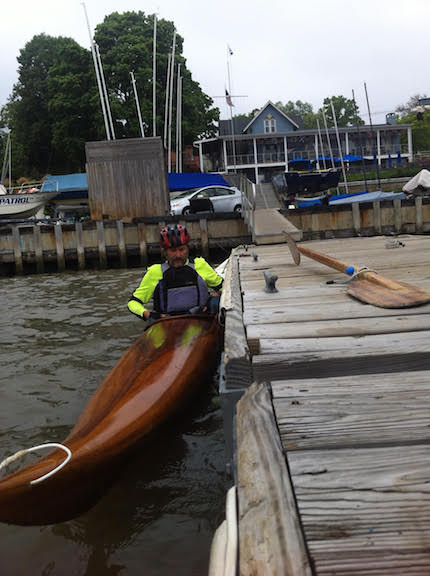 The great thing about working with Riverkeeper and other Watekeeper organizations is working from the ground up to protect the ecosystem one stream, wetland, or watershed at a time. So instead of counting national cases, I can look around the Hudson River Valley and point to individual ecosystem battles that are interconnected to the global whole, like the hillside in Fort Montgomery we protected from development, or the nitrogen discharges to Long Island Sound we restricted, the toxic lead shotgun pellets we got removed from Long Island Sound, or the permits we forced the state to issue to limit the pollution of a trout stream in the Catskills. Some of these efforts are still ongoing, like the environmental cleanups we sued to force in Newtown Creek and Hastings on Hudson.
The great thing about working with Riverkeeper and other Watekeeper organizations is working from the ground up to protect the ecosystem one stream, wetland, or watershed at a time. So instead of counting national cases, I can look around the Hudson River Valley and point to individual ecosystem battles that are interconnected to the global whole, like the hillside in Fort Montgomery we protected from development, or the nitrogen discharges to Long Island Sound we restricted, the toxic lead shotgun pellets we got removed from Long Island Sound, or the permits we forced the state to issue to limit the pollution of a trout stream in the Catskills. Some of these efforts are still ongoing, like the environmental cleanups we sued to force in Newtown Creek and Hastings on Hudson.
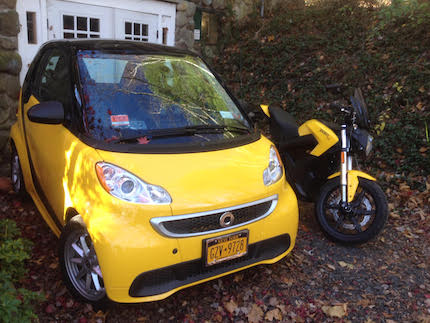
The fossil fuel industry has a huge war chest, are there enough law students choosing environmental law?
There are plenty of law students – but they need jobs that allow them to support themselves and pay their student loans. Litigating NGOs like Riverkeeper here in the Hudson River Valley and NRDC and EarthJustice at the national level play an important role providing a career path for lawyers who don’t want to represent the ExxonMobils of the world. But they rely on contributions from supporters.
Karl Coplan Speaks at the Knowledge Market at the Nyack Center

April 16, at 6:30p at Nyack Center, Karl will give a presentation based on his book, Living Sustainably Now: A Low-Carbon Vision of the Good Life, offering practical advice on how to reduce your carbon footprint, including everything from how you eat, commute, and run your house, to life enriching travel and recreation.
A meet-and-greet reception with light refreshment follows the program.
The Knowledge Market is sponsored by Lamont Doherty Earth Observatory, NyackNewsAndViews.com, Nyack Center and La Talaye Catering and Event Design.
Tickets are $20. Students tickets are $5. Scholarships are available. A portion of the proceeds goes to the Nyack Center. For more information visit NyackKnows.com.
Students take the Stage
A younger, hipper generation are stepping up to the carbon foot print plate. Emmy Udry, one of the organizers of Nyack’s participation in the global student climate strike on March 15 has joined the planning of the village’s Earth Day celebration. She is also one of the founders of the Rockland Climate Alliance (RCA). Already her group has helped the village move more smoothly towards full compliance with up coming bans on single use plastic bags.
If you’d like to learn more about future plans of the RCA email rocklandclimatealliance@gmail.com and ask to get on their mailing list.
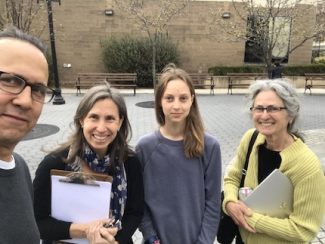
Udry, third from left, helping plan Earth Day, Nyack, April 27, 2019.
Sons of Science Perform at Earth Day 2019 in Nyack
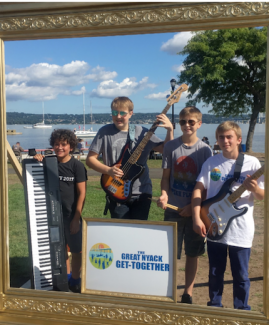
Calvin D’Andrea 16, bass, vocals
Miles D’Andrea 14, drums, vocals
Augie Davi-Fiondella 13, keys, vocals
Johnan Pollisar 13, guitar, vocals.
Earth Day 2019
For the seventh year running, Nyack will honor Mother Earth on Saturday, April 27 (Rain date 4/28) from 12 to 4p in the heart of the village at the Main Street Gazebo, Cedar Street and surrounding parking area. Kids’ activities will include arts and crafts as well as a fun, interactive Summer Play Camp sponsored by Blue Rock School. There is also live music going on all day, and vendors selling everything from jewelry to plants.
Keep Rockland Beautiful will begin and end their Community Clean-up project at the Earth Day Nyack event site. Interested participants should meet at 9:00am to join a clean-up crew at the Gazebo before Earth Day Nyack kicks off later in the day. Check keeprocklandbeautiful.org for details.
Hosted by The Nyack Chamber of Commerce and the Village of Nyack. Sponsored by Blue Rock School’s Summer Play Camp, Green Mountain Energy, and Casa del Sol restaurant.
Tell us about Environmental Litigation Clinic at Pace?
The Clinic was founded 30 years ago as a partnership between Pace Law School and the then-new Hudson Riverkeeper program. Law students need practical experience practicing law, and John Cronin, the first Riverkeeper, needed legal representation to take on the entrenched companies polluting the Hudson River. Bobby Kennedy was working on his legal masters degree at Pace at the time as well as working pro bono as a Riverkeeper attorney, so it was natural for him to take over running the Clinic.
For over thirty years now, eight to ten Pace law students each semester get real litigation experience representing Riverkeeper in its environmental cleanup battles. They are allowed to appear in court without having passed the bar yet by special permission of the New York court system. I have been co-directing the Pace Environmental Litigation Clinic for twenty five years now – since 1994 – and joining the Clinic was the best break of my life, since it has allowed me to combine my passion for the environment with the practice of law and the deep satisfaction of training and mentoring students for careers in environmental law. My former students include DEC Commissioner Basil Seggos, Waterkeeper Alliance Executive Director Marc Yaggi, and scores of other students who have gone into environmental law careers ranging from private firms to government enforcement agencies.
Is it true that climate deniers are filing Freedom of Information Requests to harass scientists?
Yes, this is one of many ways that industry funded groups are working to harass climate scientists and prevent public acceptance of climate science. The problem is that in some states, the courts have taken the position that scientists at state universities are public officials, so that their email communications are subject to public disclosure under Freedom of Information laws. Most recently, Michael Mann at Penn State was forced to publish all of the emails from his university account. You probably did not hear much about this, because there was absolutely nothing embarrassing about them. Columbia Law School’s Mike Gerrard has started a climate scientist defense fund project to provide legal representation to climate scientists being subjected to this sort of harassment.
I understand you had an extremely low carbon foot print commute from your home to work, what was it?
For over twenty years now, I have commuted to work in White Plains by paddling kayak across the river from the Nyack Boat Club, then riding a bicycle the eight miles from Tarrytown. I built the kayak myself in 1997 as a project to take my mind off of the monumentally frustrating Pyramid Mall battle we were fighting at the time. It seemed then like a simple antidote to the car culture the mall exemplified. Of course, I could only make my paddle & pedal commute in the warm and light months of the year, and then only two or three days a week. Now that the bike lane on the new Tappan Zee bridge is supposed to open, I will probably hang up my kayak paddle and just bike to work. We need to make sure the Thruway Authority keeps the bike path open late at night – it will be a great non-car commuting option, but not if they close it at dusk like they have threatened to.
If part of having a low carbon foot print being multi-modal, what are some of your transportation modalities?
Cars are killing the planet, so I have tried my best to avoid using them where possible. I went for about a decade without owning my own car (I borrowed Robin’s Prius when I really needed one). When I couldn’t paddle across the Hudson to work, I was a regular rider on the Tappan Zee Express bus, then I bought an electric motorcycle when Zero came out with the first practical model in 2012. When I totaled that motorcycle, Robin prevailed on me to look at an EV- so I ended up with a very affordable Smart Fortwo in 2015. But I bought another Zero e-moto too – they are just too much fun.
Your life partner is a scientist and polar explorer. Who is she and what are some of the things you enjoy doing together?
Robin Bell has been my life partner for pretty much my entire adult life – we started dating at Middlebury College. When we graduated, we built a small sailing dory together with a rudimentary cabin and sailed it down the Champlain Canal and Hudson River, ending up in Woods Hole, Massachusetts, where Robin got her first job as a geologist for the US Geological Survey. Robin came to NewYork to get her PhD in geophysics at Columbia while I studied law there, and Robin has gone on to become a leading polar regions science researcher. We both enjoy life, we’re together, so we enjoy life together – Robin shares my love of nature, adventure, and wild places.
One of our first dates was to go winter camping in the Adirondacks. Our love of sailing and the ocean eventually led us to buying an ocean-capable sailboat, the Mabel Rose. We named the boat after Robin’s great aunt Mabel who lived on Nantucket Island and whose partner Liz taught Robin to sail when she was growing up.
The Mabel Rose usually lives at the Nyack Boat Club. We have sailed the boat on two round trip transatlantic voyages – including a sabbatical trip to Barcelona in 2006-2007.
In Barcelona, I leaned what real paella is supposed to look like, and I brought several paella pans back with me. I make myself popular on camping trips and with our neighbors by cooking a wood-fired paella the traditional Spanish way from time to time.
How early were your children introduced to the low-carbon life style?
Since environmental consciousness has been part of my life since childhood, my own children were introduced to it from birth, of course. That meant they grew up in a house where we kept the heat down in the winter, but a nice crackling fire in the fireplace drew the family together in the living room, especially since there was no television anywhere in the house. Not having television, ironically, may be the biggest thing you can do to reduce your footprint – not because of the juice used by the television, but because television programming and advertising is designed to make us consume more. Every image we see n TV makes us think that we are missing out on a bigger fancier house or a faster car that will somehow raise our status. Skip the television and save the consumption dollars for something more fulfilling and smaller footprint – like used sailboat or something. Both our children were sailing with us from before they could walk. |
My daughter grew up thinking that the only way you could get to the Jersey Shore was by sailboat – when one of her elementary school friends told her their family had been to the beach, Beryl’s natural response was “I didn’t know you had a sailboat, too.”
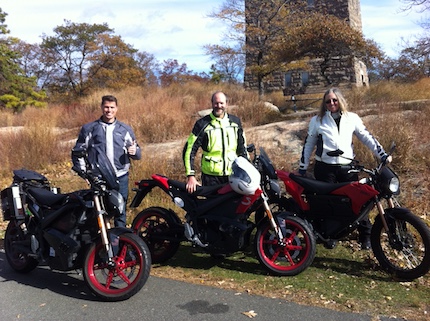 Your book Sustainably Now: A Low-Carbon Vision of the Good Life is coming out in the Fall, can you share one tip with us?
Your book Sustainably Now: A Low-Carbon Vision of the Good Life is coming out in the Fall, can you share one tip with us?
It’s easy to make big dents in your footprint without a major change in your lifestyle. If you live in a household with two conventional gas powered cars, when it comes time to trade them in replace one with a hybrid and the other with an electric vehicle. If you purchase your electricity from renewable sources, you can cut you transportation footprint by three quarters this way. The EV will have plenty of range for a typical commute, and the hybrid is available for longer family trips when needed.
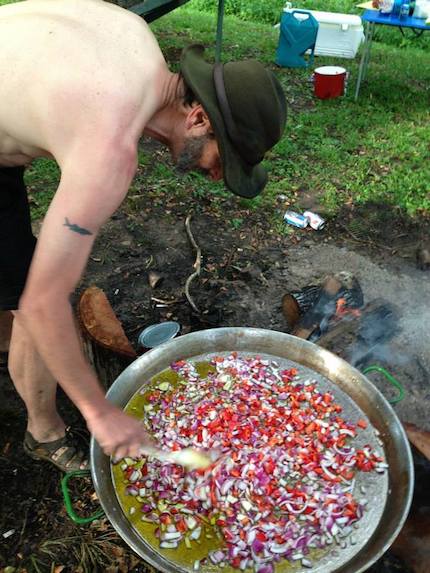 What is the average American’s carbon footprint?
What is the average American’s carbon footprint?
The most recent numbers are about 16 tons per capita
What is a good laymans explanation of carbon foot?
Carbon footprint is the amount of greenhouse gases you are responsible for, converted into the equivalent amount of CO2 (the primary human greenhouse gas).
Your direct footprint is what you emit directly in your activities (burning gas to drive or jet fuel to fly, burning oil or natural gas for heat, buying fossil fuel electricity).
Your indirect footprint includes your share of government activities and the greenhouse gas impacts embedded in stuff you buy.
There is no one definition of direct vs indirect – most people include food choices as a direct impact, some calculators now include goos and service purchases as direct.
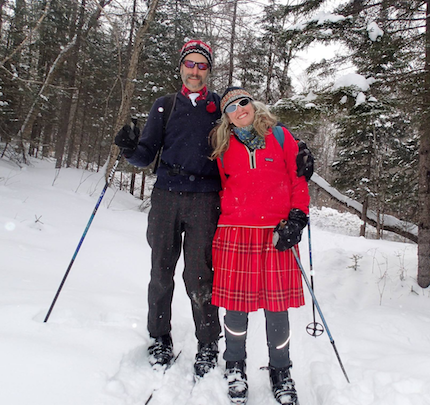 By how much have your reduced carbon footprint?
By how much have your reduced carbon footprint?
Indirect impacts are roughly equal to direct impacts. My goal is to keep my direct GHG footprint to <4 tons per year – but I include high impact foods (beef and lamb) in this tally. 4 tons per year direct is roughly 8 tons per year total – about half the US average.
Do any municipalities award people who reduce their footprint?
There are no municipal awards or tax credits specifically for lowering your footprint, but there are tax credits for solar panels, heat pumps, and electric vehicles that tend to lower your footprint.
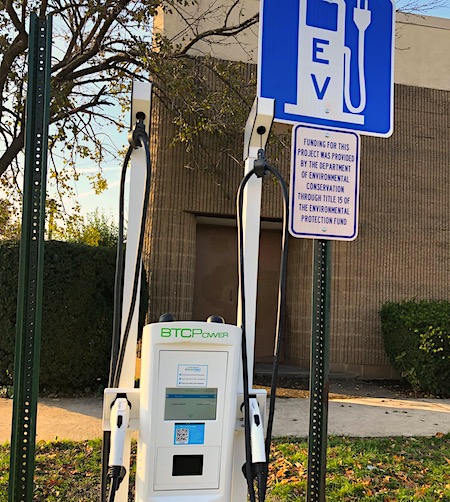 I read that oil companies are betting on carbon capture. Any future in it?
I read that oil companies are betting on carbon capture. Any future in it?
Carbon capture is much more expensive than avoiding the emissions in the first place, so it only has a future if we get desperate.
Have you used the charging ports in Nyack? Do you see the program expanding locally?
Since Nyack is pretty much home for us (we live in West Nyack), I never need to charge so nearby. But the availability of municipal charging stations really extends the range of an EV. Having that charging port in Nyack means that someone driving up from New Jersey to visit our shops and try one of the great restaurants knows they can get home without worry. Smart municipalities recognize that EV sales are increasing, and that having a charging station available is just a plus for the local economy.
Bill Batson is an activist, artist and writer who lives and sketch logs in Nyack, NY. Nyack Sketch Log: “Karl Coplan’s Cool Ride (to a Lower Carbon Footprint)” © 2019 Bill Batson. To see more, visit billbatsonarts.com


